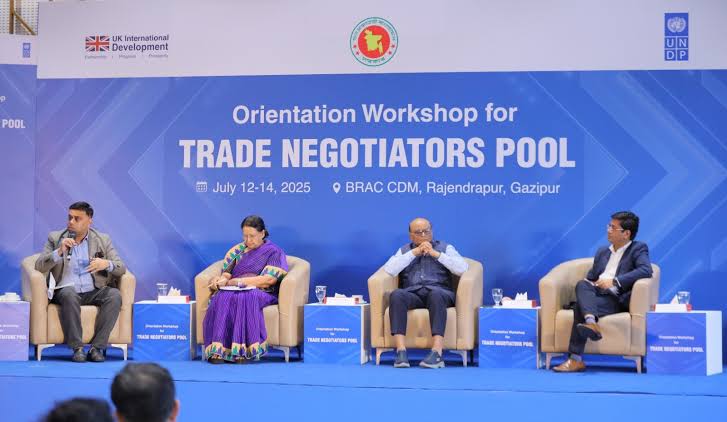Staff Correspondent
Published:2025-07-14 21:21:29 BdST
Skilled trade negotiators key to Bangladesh’s post-LDC transition
As Bangladesh approaches its graduation from Least Developed Country (LDC) status, strengthening the country’s capacity to formulate and implement effective trade policies and conduct complex trade negotiations has become a critical national priority.
To support this effort, a three-day training for a newly formed Trade Negotiators Pool is being held from 12 to 14 July in Gazipur, under the UK-funded Transformative Economic Policy Programme Phase II (TEPP-II).
The initiative is being implemented by the United Nations Development Programme (UNDP) in partnership with the Ministry of Commerce.
Held in Gazipur, the training brings together a multidisciplinary group of professionals representing different ministries, government agencies, private sector bodies, and think tanks. The Trade Negotiators Pool was established as a platform for participants to develop skills in trade negotiations.
Speaking at the opening, the chief guest, Md. Abdur Rahim Khan, Secretary in Charge (Additional Secretary), Ministry of Commerce, said, “Trade negotiation is a whole of government approach- different ministries and agencies work together. We are also increasingly involving the private sector, academia and trade-related civil society more directly than before for effective and successful trade negotiations with our partner countries. This timely initiative by the Ministry of Commerce and UNDP, and supported by the UK government, is just the beginning, and a continuous process to institutionalise the trade negotiation capability in Bangladesh”.
Owais Parray, UNDP’s Country Economic Advisor, emphasised the urgency of building trade negotiation capabilities. “Bangladesh needs effective trade negotiation capability to mitigate the impact of LDC graduation, which will lead to loss of preferential market access and in the future assist Bangladesh to negotiate bilateral, regional and multilateral trade agreements”.
Issam Mosaddeq, Economic Adviser and Head of Prosperity and Economic Growth at the UK’s Foreign, Commonwealth and Development Office (FCDO), added, “Bangladesh has started negotiating trade agreements, which is an increasingly complex area of public policy and international affairs. The UK Government is pleased to support Bangladesh to develop deep expertise on trade policy and negotiation skills both within and outside government.”
A high-level panel discussion, moderated by Tanvir Mahmud, Senior Governance Specialist, UNDP Bangladesh, featured distinguished experts Dr. Zaidi Sattar, Ferdaus Ara Begum, and Dr. M. Masrur Reaz.
Also present were Professor Mustafizur Rahman, Distinguished Fellow at the Centre for Policy Dialogue (CPD), Humayun Kabir, Former Ambassador and President of Bangladesh Enterprise Institute, Dr. Mohammad Abdur Razzaque, Chairman, Research and Policy Integration for Development (RAPID), Dr. Mostafa Abid Khan, Former Member, Bangladesh Trade and Tariff Commission and Mr. Alexey Kravchenko, Economic Affairs Officer, UNESCAP.
The training covers key areas including trade frameworks, legal instruments, negotiation techniques, trade analysis, and real-world case studies.
It marks the first of a series of capacity-building initiatives under TEPP-II aimed at supporting Bangladesh’s smooth transition from LDC status and advancing inclusive, sustainable economic growth.
Unauthorized use or reproduction of The Finance Today content for commercial purposes is strictly prohibited.


